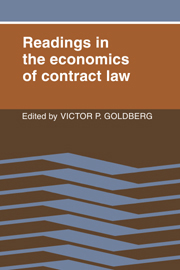Book contents
- Frontmatter
- Contents
- Preface
- Readings in the economics of contract law
- Part I Some preliminaries
- Part II Contract law and the least cost avoider
- Part III The expectation interest, the reliance interest, and consequential damages
- Part IV The lost-volume seller puzzle
- Part V Specific performance and the cost of completion
- Part VI Power, governance, and the penalty clause puzzle
- Part VII Standard forms and warranties
- Part VIII Duress, preexisting duty, and good faith modification
- Part IX Impossibility, related doctrines, and price adjustment
- Questions and notes on impossibility and price adjustment
- References
- Index of cases
- Author index
- Subject index
Part VII - Standard forms and warranties
Published online by Cambridge University Press: 10 November 2010
- Frontmatter
- Contents
- Preface
- Readings in the economics of contract law
- Part I Some preliminaries
- Part II Contract law and the least cost avoider
- Part III The expectation interest, the reliance interest, and consequential damages
- Part IV The lost-volume seller puzzle
- Part V Specific performance and the cost of completion
- Part VI Power, governance, and the penalty clause puzzle
- Part VII Standard forms and warranties
- Part VIII Duress, preexisting duty, and good faith modification
- Part IX Impossibility, related doctrines, and price adjustment
- Questions and notes on impossibility and price adjustment
- References
- Index of cases
- Author index
- Subject index
Summary
One of the benefits of editing a collection is that one can clarify, reinterpret, or recant one's own earlier writings. I shall take advantage of that opportunity here with regard to Selection [7.1]. The basic point is still correct. Rational buyer ignorance and adverse selection create the possibility that standard form contract terms will be inefficient; it is possible that judicial supervision or legislative intervention would improve the situation. Moreover, my argument was sufficiently qualified so that a sympathetic reader could conclude that I was only stating a possible case for overriding the terms included in the standard forms. Nonetheless, the tone suggests (and that coincides with my beliefs when the paper was written) that courts and legislatures should take a rather aggressive stance with regard to the secondary terms of standard form contracts. I am much less sanguine about the possible utility of such intervention today.
The roots of this change in opinion are both a decreased faith in the ability of courts and legislatures to do the job well and an increased faith in the ability of private parties to cope with, if not fully resolve, the problems associated with standard form contracts. Courts and legislatures have learned how to justify intervention. But they have not seemed to learn how to intervene. They have not come to appreciate the subtleties in designing efficient contract terms. It is not enough to say that a disclaimer of consequential damages was not understood or consented to by the buyer. One must also understand the possible rationale for such a disclaimer.
- Type
- Chapter
- Information
- Readings in the Economics of Contract Law , pp. 167 - 168Publisher: Cambridge University PressPrint publication year: 1982



